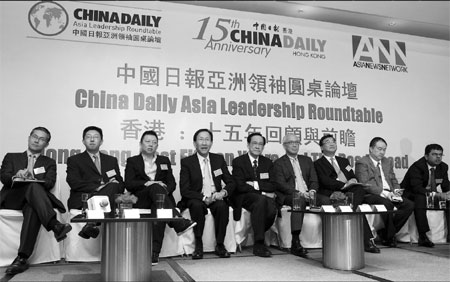Focus on sustainable growth
Updated: 2012-10-09 06:50
By Oswald Chen(HK Edition)
|
|||||||||
|
Panelists take questions from the audience in the "Hong Kong, The Road Ahead" forum on Monday. Cooperations and integrations with the mainland are of great importance to the city's future growth, experts said. Edmond Tang / China Daily |
Diversify, cooperate and integrate to achieve more progress: experts
Diversification, further cooperation and economic integration with the mainland are crucial to sustainable economic growth in Hong Kong, experts told a China Daily Asia Leadership Roundtable forum on Monday.
Economists, business leaders and public policy think tank strategists were invited to review the economic and social development of Hong Kong in the last 15 years and examine the challenges and opportunities in the next five years at the China Daily Asia Leadership Roundtable held on Monday in Hong Kong. The roundtable event themed "Hong Kong, Past Fifteen Years and The Road Ahead", was part of the program to celebrate the 15th anniversary of the China Daily Hong Kong Edition.
Edward Chen, distinguished fellow at the University of Hong Kong's Centre of Asian Studies, voiced his opinion that Hong Kong should sustain its economic growth in the future through diversifying its economic base and enhancing its cooperation with the mainland government.
Chen particularly highlighted the need for the Hong Kong government to shake off its so-called positive non-interventionism. "Time has gone for non-interventionism. After all, there is a wrong interpretation of the positive non-interventionism for so many years," Chen said.
"In the age of the New Economy, there are many acquired comparative advantages in the economic development process that need to be nurtured by the government. The Hong Kong government should proactively promote the pharmaceutical, environmental and cultural industries as well as leverage the city's niches."
MTR Corporation Chairman Raymond Ch'ien echoed Chen's opinion, saying that Hong Kong should have the vision, courage and the skills to be the standard setter for the mainland.
"Hong Kong has competitive niches in the education industry and health care services industry," said Ch'ien. "By setting the standard for the mainland, the city can help the country to become a global leader as well as can give the Hong Kong economy a greater degree of sustainability and scalability."
From the financial regulator's point of view, Securities and Futures Commission (SFC) Chairman Eddy Fong stressed that the SFC in the future will strengthen cooperation with the mainland in strengthening financial regulation.
"Working with the mainland and other countries' financial regulators is the survival element of Hong Kong to ensure the local capital market can be the ideal liquid platform for foreign financial institutions to come to Hong Kong for making business," Fong reckoned.
The cultivation of scientific talent is another aspect for cooperation between both Hong Kong and the mainland.
"There is a second chance for Hong Kong to recapture the missed opportunities to promote scientific and technological development," said Wong Yuk-shan, vice-president of Hong Kong University of Science and Technology. Wong had been critical of the lack of scientific talent development in Hong Kong before the handover.
"Many local universities have already established their research institutions in the Pearl River Delta (PRD) region and these institutions have strengthened the knowledge base of the city's transportation technology, information technology and communication technology," Wong reckoned.
"The Hong Kong and the mainland government should encourage local and mainland institutions to set up more joint research centers in the PRD region that can create a win-win foundation for the technological development in the city and the mainland," Wong added.
The Hong Kong film industry is the other local industry segment that can benefit from the greater opening of the mainland market.
"The cultural tastes of the PRD region are more similar to Hong Kong, so that local film-makers can have a better chance of success in the Guangdong market," said local veteran film producer Ko Chi-sum, who is currently the chief executive officer and producer of the Spring-Time Stage.
"If local films can be more easily screened in Guangdong province, it can make it easier for local film-makers to penetrate into the Guangdong province first and then to extend to the other parts of the national market," Ko added.
oswald@chinadailyhk.com
(HK Edition 10/09/2012 page2)
